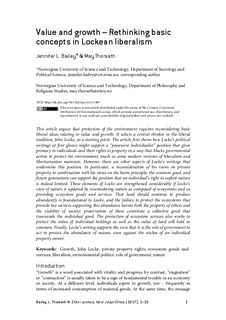| dc.contributor.author | Bailey, Jennifer L. | |
| dc.contributor.author | Thorseth, May | |
| dc.date.accessioned | 2017-03-13T08:23:07Z | |
| dc.date.available | 2017-03-13T08:23:07Z | |
| dc.date.created | 2017-03-08T15:32:33Z | |
| dc.date.issued | 2017 | |
| dc.identifier.citation | Etikk i praksis. 2017, 2017 (1), 1-23. | nb_NO |
| dc.identifier.issn | 1890-3991 | |
| dc.identifier.uri | http://hdl.handle.net/11250/2433789 | |
| dc.description.abstract | This article argues that protection of the environment requires reconsidering basic liberal ideas relating to value and growth. It selects a central thinker in the liberal tradition, John Locke, as a starting point. The article first shows how Locke’s political writings at first glance might support a “possessive individualist” position that gives primacy to individuals and their rights to property in a way that blocks governmental action to protect the environment, much as some modern versions of liberalism and libertarianism maintain. However, there are other aspects of Locke’s writings that undermine this position. In particular, a reconsideration of his views on private property in combination with his views on the harm principle, the common good, and future generations can support the position that an individual’s right to exploit nature is indeed limited. These elements of Locke are strengthened considerably if Locke’s view of nature is updated by reconsidering nature as composed of ecosystems and as providing ecosystem goods and services. That land should continue to produce abundantly is foundational to Locke, and the failure to protect the ecosystems that provide key services supporting this abundance harms both the property of others and the viability of society: preservation of these constitute a collective good that transcends the individual good. The protection of ecosystem services also works to protect the value of individual holdings as well as the value of land still held in common. Finally, Locke’s writing supports the view that it is the role of government to act to protect the abundance of nature, even against the wishes of an individual property owner. | nb_NO |
| dc.language.iso | eng | nb_NO |
| dc.publisher | NTNU Open Access Journals | nb_NO |
| dc.rights | Navngivelse 4.0 Internasjonal | * |
| dc.rights.uri | http://creativecommons.org/licenses/by/4.0/deed.no | * |
| dc.title | Value and Growth -- Rethinking basic concepts in Lockean liberalism | nb_NO |
| dc.type | Journal article | nb_NO |
| dc.type | Peer reviewed | nb_NO |
| dc.source.pagenumber | 1-23 | nb_NO |
| dc.source.volume | 2017 | nb_NO |
| dc.source.journal | Etikk i praksis | nb_NO |
| dc.source.issue | 1 | nb_NO |
| dc.identifier.doi | http://dx.doi.org/10.5324/eip.v11i1.1967 | |
| dc.identifier.cristin | 1456689 | |
| dc.description.localcode | This is an open access article distributed under the terms of theCreative Commons Attribution 4.0 International License, which permits unrestricted use, distribution, and reproduction in any medium, provided the original author and source are credited. | nb_NO |
| cristin.unitcode | 194,67,25,0 | |
| cristin.unitcode | 194,62,70,0 | |
| cristin.unitname | Institutt for sosiologi og statsvitenskap | |
| cristin.unitname | Institutt for filosofi og religionsvitenskap | |
| cristin.ispublished | true | |
| cristin.fulltext | original | |
| cristin.qualitycode | 1 | |

